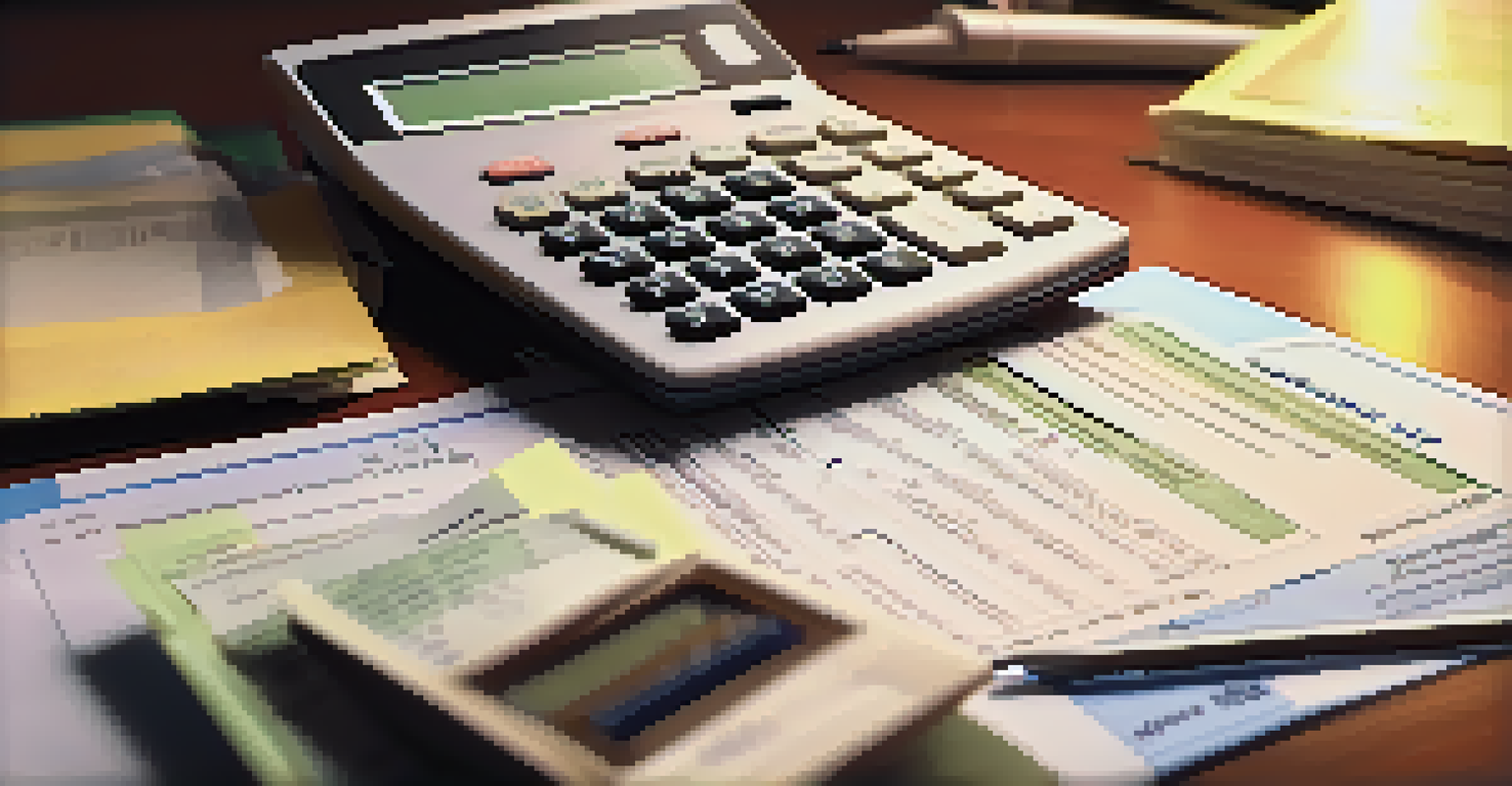How Bankruptcy Affects Your Federal Tax Obligations

What is Bankruptcy and Its Types?
Bankruptcy is a legal process that allows individuals or businesses to eliminate or repay debts under the protection of the federal bankruptcy court. There are various types of bankruptcy, but the two most common for individuals are Chapter 7 and Chapter 13. Chapter 7 involves liquidating assets to pay off creditors, while Chapter 13 allows for a repayment plan over three to five years.
Bankruptcy is not the end; it's a new beginning, a chance to start over and take control of your financial future.
Understanding the type of bankruptcy you file for is crucial, as it will influence how your debts, including tax liabilities, are treated. For instance, certain taxes might be discharged in Chapter 7, while Chapter 13 may allow you to pay them off over time. This distinction can significantly impact your financial recovery post-bankruptcy.
Ultimately, knowing your options gives you a clearer picture of how bankruptcy can affect not just your debts but also your federal tax obligations.
How Bankruptcy Affects Tax Debts
One of the most pressing questions people have is whether bankruptcy can eliminate tax debts. In many cases, it can, but there are specific conditions that must be met for taxes to be discharged. Generally, income taxes can be discharged if they meet the criteria of being due for at least three years, filed on time, assessed more than 240 days ago, and not related to fraud.

However, not all tax debts are dischargeable. For example, certain trust fund taxes, like payroll taxes, cannot be eliminated through bankruptcy. Understanding these nuances is key to navigating your federal tax obligations after filing for bankruptcy.
Understanding Bankruptcy Types
Choosing the right type of bankruptcy, such as Chapter 7 or Chapter 13, is crucial as it affects how debts, including tax liabilities, are handled.
It's advisable to consult a tax professional or bankruptcy attorney to assess your situation accurately and determine which of your tax debts could potentially be eliminated.
Impact on Future Tax Returns
Filing for bankruptcy can also affect your future tax returns in several ways. For starters, any forgiven debts that are discharged in bankruptcy may be considered income by the IRS, leading to potential tax obligations in the year of discharge. This means that while you may have relieved some financial burden, you could face a new tax liability.
The only way to get out of a financial mess is to learn from it and plan for a better tomorrow.
Additionally, if you're on a repayment plan under Chapter 13, you must stay current on your tax returns and obligations. Failing to do so could jeopardize your bankruptcy plan and lead to dismissal of your case. Staying organized and aware of your tax status is essential during this period.
Therefore, it's critical to understand how your bankruptcy might create new tax responsibilities and to plan accordingly.
Filing Your Taxes During Bankruptcy
When you're in the midst of bankruptcy, you still need to file your tax returns on time. Although your tax debts might be included in your bankruptcy, failing to file can complicate your case and lead to additional penalties. It's a common misconception that you can skip filing; however, this isn't the case.
In fact, the bankruptcy court requires that all tax returns be filed, even if you cannot pay the taxes owed. This ensures transparency and allows the court to consider all financial aspects during your bankruptcy proceedings. Ignoring this obligation can lead to further complications with your case.
Tax Debts and Bankruptcy Limitations
While some tax debts can be discharged in bankruptcy, specific conditions must be met, and not all tax obligations are eligible for elimination.
So, whether you owe taxes or expect a refund, make sure to file your returns to keep your bankruptcy process on track.
Tax Refunds and Bankruptcy
If you anticipate a tax refund during or after your bankruptcy case, it's important to understand how that refund may be treated. In many instances, tax refunds are considered property of the bankruptcy estate, which means they could be used to pay creditors. This is especially true in Chapter 7 bankruptcy, where assets are liquidated for debt repayment.
In Chapter 13, however, you might be able to keep your tax refund as long as you continue to make your regular payments to creditors. It's crucial to discuss this with your bankruptcy attorney, as they can provide guidance based on your specific circumstances and the timing of your refund.
Ultimately, understanding the implications of a tax refund can help you make informed decisions during your bankruptcy proceedings.
The Role of Tax Professionals in Bankruptcy
Navigating the intersection of bankruptcy and federal taxes can be complex, which is why enlisting the help of tax professionals is a wise choice. They can provide valuable insights into how bankruptcy will affect your specific tax situation, helping you avoid pitfalls and make informed decisions. This expertise can be especially beneficial when it comes to understanding which debts can be discharged.
A tax professional can also assist in ensuring that your tax returns are filed correctly and on time during bankruptcy. They can help you strategize how to manage your tax obligations effectively while you work through your bankruptcy plan. Their support can be instrumental in alleviating anxiety surrounding tax issues.
The Importance of Tax Professionals
Consulting a tax professional during bankruptcy can help you navigate complexities and ensure timely filing of tax returns, minimizing potential pitfalls.
In short, having a trusted tax professional in your corner can make the bankruptcy process smoother and less stressful.
Conclusion: Planning for a Fresh Start
Bankruptcy can serve as a fresh start for those overwhelmed by debt, but it's essential to approach it with an understanding of its impact on federal tax obligations. From potential discharge of tax debts to the necessity of filing returns, there are many factors to consider. Being informed can make a significant difference in how you manage your finances going forward.
As you emerge from bankruptcy, planning for your tax responsibilities and overall financial health is crucial. Developing a budget and understanding your new financial landscape can empower you to make better choices. Remember, the goal of bankruptcy is to provide relief and a path toward a more stable financial future.

By staying informed and seeking professional guidance, you can confidently navigate your tax obligations and fully embrace your fresh start.